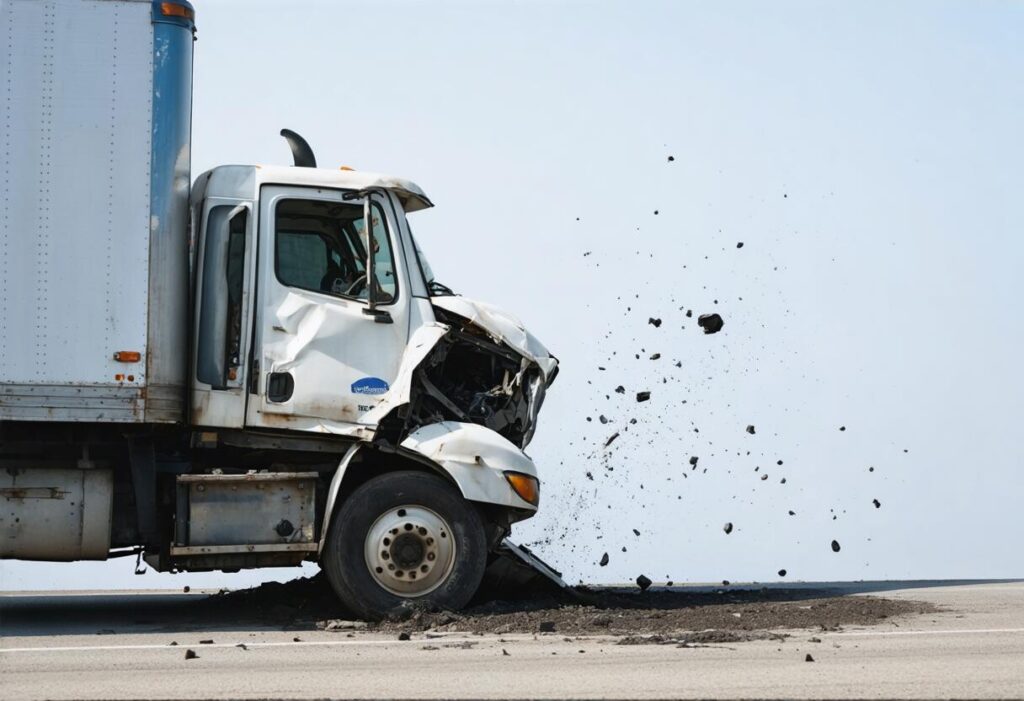TL;DR
Truck accidents in Georgia can lead to wrongful death claims when negligence is involved. Victims’ families may seek compensation for losses caused by these tragic incidents. Understanding Georgia’s laws and the factors contributing to truck accidents is crucial for pursuing justice.
Key Highlights
- Common Causes: Driver fatigue, distracted driving, speeding, and mechanical failures are leading causes of truck accidents in Georgia.
- Georgia Laws: Specific state regulations govern truck operations, including licensing, hours of service, and maintenance standards.
- Wrongful Death Claims: Families can pursue compensation for medical expenses, lost income, pain and suffering, and more.
- Statute of Limitations: In Georgia, wrongful death claims must be filed within two years from the accident date.
- Legal Process: Steps include gathering evidence, proving negligence, and working with experienced attorneys to build a strong case.
- Preventative Measures: Enhancing driver training, enforcing safety regulations, and regular vehicle inspections can reduce the occurrence of truck accidents.

Georgia faces significant challenges concerning truck-related accidents, which often result in severe injuries and fatalities. According to recent data, thousands of truck accidents occur annually, leading to numerous wrongful death cases. These incidents not only devastate families but also highlight the critical need for stringent safety measures within the state’s transportation sector.
The legal framework in Georgia provides avenues for families to seek justice through wrongful death lawsuits when negligence is a factor. Georgia Code Title 51 outlines specific provisions that address wrongful death claims, ensuring that victims’ families receive appropriate compensation. Understanding these laws is essential for navigating the complexities of such cases.
Addressing truck accident wrongful death in Georgia involves examining the underlying causes, legal implications, and support systems available to affected families. This exploration offers valuable insights into obtaining justice and preventing future tragedies through informed actions and legal recourse.
Understanding Wrongful Death in Truck Accidents
Wrongful death occurs when a person’s death is caused by the negligence or misconduct of another party. In the context of truck accidents in Georgia, this typically involves situations where truck drivers, trucking companies, or other parties fail to uphold safety standards, leading to fatal collisions.
Legal Definition and Criteria
Under Georgia law, a wrongful death claim must demonstrate that the defendant’s actions directly caused the death. This involves proving:
- Negligence: Failure to exercise reasonable care, such as distracted driving or speeding.
- Causation: Establishing a direct link between the negligent action and the fatal outcome.
- Damages: Quantifiable losses resulting from the death, including medical expenses, funeral costs, and loss of income.
Common Scenarios
- Driver Fatigue: Truck drivers operating beyond legal driving hours, leading to decreased alertness.
- Distracted Driving: Use of mobile devices or other distractions while driving.
- Speeding: Exceeding speed limits, especially in hazardous conditions.
- Mechanical Failures: Poor vehicle maintenance leading to brake failures or tire blowouts.
Georgia’s Legal Framework for Wrongful Death Claims
Georgia law provides a structured process for pursuing wrongful death claims, ensuring that families have a clear path to seek compensation.
Applicable Georgia Codes
Title 51 of the Georgia Code outlines wrongful death statutes, specifying who can file a claim and the types of damages available. Key provisions include:
- Surviving Family Members: Spouses, children, and sometimes parents can file a wrongful death claim.
- Time Limits: Claims must be filed within two years from the date of death.
- Types of Damages: Economic losses like medical bills and non-economic losses such as emotional suffering.
Filing a Claim
The process begins with consulting a qualified attorney who specializes in wrongful death cases. They assist in gathering necessary documentation, such as accident reports, medical records, and financial statements, to build a strong case.
Comparative Fault
Georgia follows a comparative fault system, meaning that compensation can be adjusted based on the degree of fault attributed to each party involved in the accident.
Factors Contributing to Truck Accidents in Georgia
Understanding the root causes of truck accidents is essential for both prevention and legal accountability.
Driver-Related Factors
- Fatigue: Long driving hours without adequate rest contribute to impaired decision-making.
- Distracted Driving: Use of electronic devices diverts attention from the road.
- Inexperience: Lack of proper training for handling large vehicles increases accident risk.
Vehicle-Related Factors
- Maintenance Issues: Poorly maintained trucks are more prone to mechanical failures.
- Equipment Failures: Faulty brakes or tire blowouts can lead to loss of vehicle control.
- Overloading: Exceeding weight limits affects vehicle stability and braking efficiency.
Environmental Factors
- Weather Conditions: Rain, fog, and ice reduce visibility and road traction.
- Road Conditions: Potholes, uneven surfaces, and inadequate signage contribute to accidents.
- Traffic Congestion: High traffic volumes increase the likelihood of collisions.
Pursuing a Wrongful Death Claim After a Truck Accident
Navigating a wrongful death claim requires careful planning and expert legal assistance to ensure all aspects are adequately addressed.
Initial Steps
- Secure Evidence: Collect accident reports, witness statements, and any available surveillance footage.
- Documentation: Gather all relevant financial records and proof of loss.
- Consultation: Meet with an experienced attorney to discuss the viability of the case.
Building the Case
- Proving Negligence: Demonstrate that the defendant’s actions deviated from standard care practices.
- Expert Testimonies: Utilize expert witnesses to support claims regarding technical aspects of the accident.
- Legal Arguments: Develop a compelling narrative that links the defendant’s negligence to the wrongful death.
Settlement vs. Trial
Many wrongful death claims are settled out of court through negotiations. However, if a fair settlement cannot be reached, the case may proceed to trial where a judge or jury determines the outcome.
Compensation in Wrongful Death Cases
The financial aspect of wrongful death claims aims to alleviate the burdens faced by the deceased’s family.
Types of Damages
- Economic Damages: Cover tangible losses such as funeral expenses, medical bills, and loss of income.
- Non-Economic Damages: Address intangible losses like emotional distress, loss of companionship, and mental anguish.
- Punitive Damages: In cases of gross negligence, additional compensation may be awarded to punish the defendant and deter future misconduct.
Calculating Compensation
Determining the appropriate compensation involves assessing the extent of the family’s losses and the defendant’s level of responsibility. An atlanta wrongful death attorney will work to ensure that all eligible damages are accounted for in the claim.
Factors Affecting Compensation
- Severity of Negligence: Greater negligence typically results in higher compensation.
- Impact on Family: The more significant the loss experienced by the family, the higher the potential compensation.
- Legal Precedents: Previous similar cases’ outcomes can influence the compensation amount.
Preventing Truck Accidents and Ensuring Safety
Preventing truck accidents requires a multifaceted approach involving regulations, education, and technological advancements.
Regulatory Measures
- Strict Licensing Requirements: Ensuring only qualified drivers operate large vehicles.
- Regular Inspections: Mandating routine vehicle checks to identify and fix potential issues.
- Enforcing Hours of Service: Limiting driving hours to prevent fatigue-related accidents.
Driver Training and Education
- Comprehensive Training Programs: Providing drivers with the skills needed to handle emergencies and maintain focus.
- Ongoing Education: Keeping drivers informed about new safety protocols and regulations.
Technological Innovations
- Safety Features: Implementing advanced braking systems, lane departure warnings, and collision avoidance technologies in trucks.
- Telematics: Using GPS and monitoring systems to track driving patterns and identify risky behaviors.
Public Awareness Campaigns
- Community Education: Informing the public about sharing the road safely with large trucks.
- Industry Collaboration: Working with trucking companies to promote a culture of safety.
Conclusion
Truck accident wrongful death cases in Georgia are complex and emotionally charged, requiring a thorough understanding of both legal and logistical aspects. Families affected by such tragedies deserve compassionate support and expert legal guidance to navigate the aftermath. By grasping the contributing factors to truck accidents and the pathways available for seeking justice, victims’ loved ones can pursue rightful compensation and advocate for safer transportation practices. If you or someone you know has been impacted by a truck accident, seeking a free case evaluation can be a crucial first step towards achieving closure and holding responsible parties accountable. Taking action today ensures that your family’s losses are recognized and that steps are taken to prevent future accidents.






